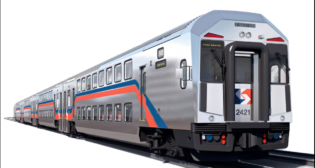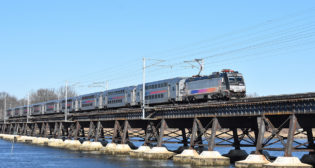
Lhota departs New York MTA
Written by William C. Vantuono, Editor-in-Chief
Just-resigned MTA Chairman Joe Lhota at a news conference with New York Mayor Bill de Blasio, left, and Gov. Andrew Cuomo, Monday, Dec. 11, 2017, outside the Port Authority Bus Terminal in New York. Photo courtesy Mark Lennihan/Associated Press.
In a move that some observers call surprising (and others not), New York Metropolitan Transportation Authority Chairman Joe Lhota resigned his post on Nov. 9, only one week after he expressed his intention to stick with the MTA at a board meeting.

MTA Vice Chairman Fernando Ferrer is now MTA Acting Chairman.
Vice Chairman Fernando “Freddy” Ferrer, in accordance with MTA procedure, has become Acting Chairman at a critical time for the MTA. At the Nov. 15 board meeting, over which Ferrer (Bronx Borough President from 1987 to 2001) will preside, the MTA will release its four-year outlook, which is preliminary to adopting a 2019 budget, voted upon in December.
Lhota, 64, was appointed Chairman last year on a part-time basis for a token $1 salary, keeping his full-time post as Senior Vice President, Vice Dean and Chief of Staff at NYU Langone Health. He delegated responsibility for much of the MTA’s day-to-day operations to President Patrick Foye and Managing Director Veronique “Ronnie” Hakim.
Lhota succeeded Tom Prendergast (Railway Age’s 2017 Railroader of the Year), who retired from the MTA in January 2017 and is now with STV, Inc. as Executive Vice President and Chief Strategic Officer. It was Lhota’s second tour of duty at the MTA; he had served as Chairman from January to December 2012. He resigned as MTA Chairman to run for mayor of New York City in 2013 on the Republican ticket. Bill De Blasio, a Democrat, crushed Lhota in that election with 73% of the vote. The two had frequently been at odds, engaging in a very public war of words over the city’s share of funding the New York City Transit subway system, which carries 5 million people a day and is in need of major investment.
New York Gov. Andrew Cuomo, who hand-picks the MTA Chairman and typically seeks outside talent (an exception was Prendergast, who had previously served as President of the Long Island Rail Road and NYCT), said in a tweet, “Joe Lhota has dedicated decades of his life to public service, culminating in two tours of duty at the helm of the MTA. He stabilized the subway system, appointed a new leadership structure, and led with a steady hand during some of the agency’s most challenging moments.”
In a letter to MTA employees, Ferrer, Hakim, Foye, Chief Development Officer Janno Lieber and Chief Financial Officer Bob Foran said, “We are extremely grateful for the steady leadership [Joe Lhota] provided during his tenure. Joe launched the Subway Action Plan, reinvigorated the MTA and set us on the path to success. His focus on delivering better daily service for our customers and prioritizing cost containment and procurement reform initiatives and working to create long-term sustainable funding sources were the hallmarks of his time leading the board.”
When he accepted the MTA chairmanship for the second time, Lhota said he took the position for the “sole purpose of halting the decline of service and stabilizing the system for my fellow New Yorkers.” He frequently referred to the $800 million subway emergency repair package devised during in his first month at the MTA. Recently appointed NYCT President Andy Byford has taken on rebuilding and modernizing the 114-year-old subway system—the city’s transportation lifeblood—with his ambitious, $30 billion “Fast Forward” program.
Some observers say Lhota’s resignation is not surprising, as it is the most recent of several departures from the Cuomo Administration. The governor, who won re-election Nov. 6, is cleaning house for what will be his third term in office. Prior to Lhota’s departure, three state commissioners resigned; more are likely to follow.



